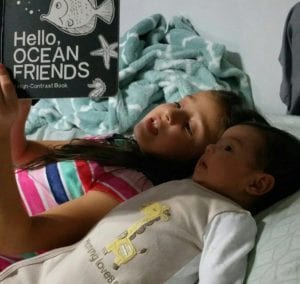FIU’s dedication to excellence is not limited to being a Worlds Ahead university for its students. FIU is also committed to the community, developing partnerships and programs that help community members meet and overcome challenges. Some of these programs focus on the community’s newest and most vulnerable members: babies and children.
The FIU Parents as Teachers (PAT4YOU) is a home visitation program serving families with children from birth to age three. FIU’s PAT4YOU uses a comprehensive research-based and evidence-informed program from Parents as Teachers, an international nonprofit organization, to provide learning experiences that fit the individual needs of each family and child. The PAT4You team, which includes master level members Yina Herrera and Halida Florez, works tirelessly to serve the families in the program and conducts home visits every day, even in inclement weather.
Suzanna Rose, associate provost for the Office to Advance Women, Equity & Diversity, first heard about the Parents as Teachers program while working at the University of Missouri. As a psychology professor whose early work included research in childhood development, she saw its success firsthand. After moving to FIU, she learned the program was looking for an academic affiliation, and decided it would be a great collaboration between FIU and The Children’s Trust.
 Debbie Rudnicki, director of PAT4YOU, agrees, especially when taking into account the community’s demographics. She says that in Miami-Dade County, “it is estimated that 11.3 percent of babies are born prematurely. FIU’s support of PAT4YOU has enabled these children to receive developmental services while enhancing parenting skills. Our program provides optimal early learning development and high quality services for families.”
Debbie Rudnicki, director of PAT4YOU, agrees, especially when taking into account the community’s demographics. She says that in Miami-Dade County, “it is estimated that 11.3 percent of babies are born prematurely. FIU’s support of PAT4YOU has enabled these children to receive developmental services while enhancing parenting skills. Our program provides optimal early learning development and high quality services for families.”
PAT4YOU staff often deal with families whose circumstances don’t always allow them to get the help they need. “Some parents don’t know what behaviors are appropriate for certain ages, especially early on,” Rose says. “The program provides parents with the knowledge and training they need to approach issues in a calm and objective fashion.”

Rudnicki is also director of FIU TripleP4U, an adaption of the Triple P System (Positive Parenting Program). This system utilizes a multilevel parenting intervention to increase the knowledge, skills and confidence of parents in order to reduce the prevalence of emotional and behavioral problems.
FIU TripleP4U focuses on childhood obesity intervention. “The obesity epidemic in young children has skyrocketed, and we saw the need for a program that would blend behavior modification with nutritional and physical education,” Rudnicki says .
Rose and Rudnicki worked to secure the necessary funding for the programs, including grants from The Children’s Trust, a Miami-Dade organization established in 2002, whose mission is to improve the lives of Miami-Dade County children and families. A dedicated source of revenue derived from property taxes, The Children’s Trust grants funded FIU’s PAT4YOU in 2006 and then TripleP4U in 2011; both programs have been renewed continuously. Enrollment in the program is not open – families are referred from area hospitals, and participation is dictated by criteria established by the Children’s Trust.
The programs have been highly successful in terms of developmental assessments conducted by the staff and by parent satisfaction surveys. More than 95 percent of participants in PAT4YOU have completed the full three year program, and many have credited the program with helping them successfully raise their children.
One mom wrote to the program’s staff to thank them: “It was the most difficult time in our lives when our triplet babies were born so unexpected and so prematurely . . . You not only assisted us financially, but also taught us and encouraged us to be better parents. Now our girls are healthy and beautiful. We are so grateful to you personally and to your organization, who were willing to reach out to us, helping us go through the most difficult time.”
“Ultimately, we empower parents so that their children can realize and reach their fullest potential,” Rudnicki says.






